If there is a historical figure to whom the description of power in the shadows can be applied, it is Flavio Ricimero, a Roman general from the times of the Lower Empire, when the emperors were already so weak that not only did their government depend on the strong man in power, but also the latter He was the one who named them. And in that Ricimero took the cake, because in his curriculum there are up to four presidents in eleven years.
Ricimer was an Arian Suevo from Gallaecia, an ancient Roman province in the northwestern Iberian Peninsula that in the 5th century AD. It had been occupied by that people - together with the Alans, who settled in the eastern zone - creating a kingdom subject to the rule of Rome through the formula of the foedus (an early version of the federation). Son of King Requila and grandson of Hermerico, the creator of said kingdom, he also had Visigothic blood on his mother's side, daughter of King Walia.
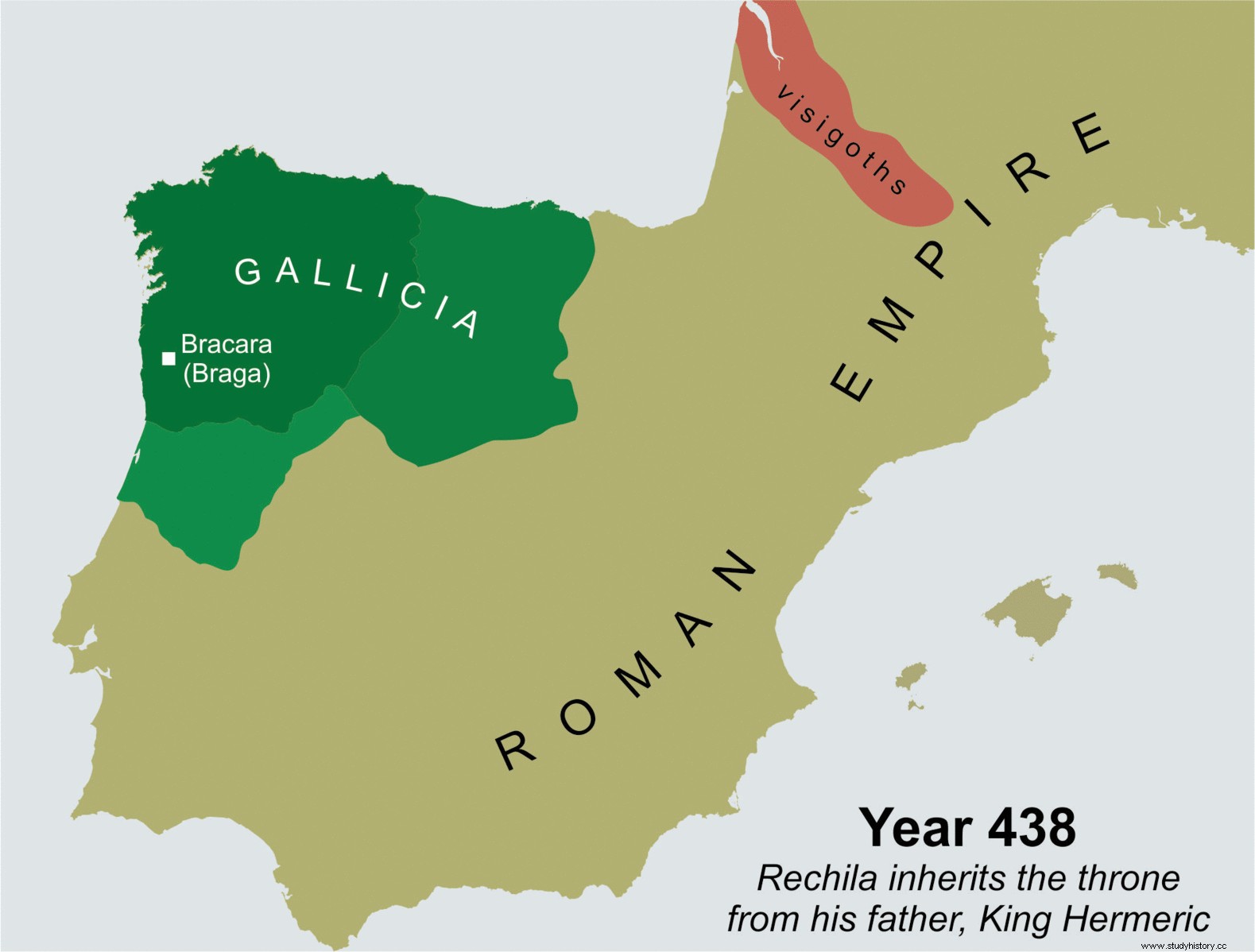
Visigoths and Swabians, originally allies -hence the marriage of their parents-, became enemies later, tilting the balance towards the former. This probably led Ricimer to a habitual exit:putting himself at the service of Rome. It would be in the capital where he would carve out his own destiny, beginning under the orders of Flavio Aetius.
This was the magister millitum (the highest military hierarchy during the Lower Empire) of Emperor Valentinian III, whose reign until then had made clear the weakness of the once great power, losing the provinces of Africa and Britannia, as well as considerable parts of Gaul and Hispania.
In fact, the court was not even in Rome but in Ravenna, although Valentinian had to leave it before the advance of Attila, who asked the emperor for the hand of his sister Honoria. It would be Aetius who would stop the Huns in the Catalaunian Fields, just as he later defeated the Visigoths. So much so that Valentinian, judging him dangerous, killed him - with his bare hands according to some sources - without caring that he had made him his son-in-law. The following year, he himself was assassinated.
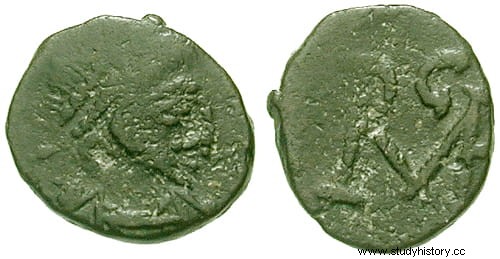
It is not clear whether the criminals were followers of Aetius or Petronius Maximus, an ambitious senator; in any case, he took the opportunity to seize the throne by displacing the other candidates, a guard of Aetius named Maximian and General Julius Valerius Majorian, who was supported by Licinia Eudoxia, widow of the late emperor (whom Petronius forced to marry him ). The new Caesar did not last long, barely two and a half months. Genseric's vandals were marching on Rome and the panicked people rose up and killed him and his heir. Three days later, in effect, the city was sacked.
The new emperor was the magister millitum Eparquio Avito, who ascended the throne supported by the Visigoth king Theodoric II, with whom he parleyed when Petronio Máximo died. The alliance with Theodoric favored Ricimer being named comes , a title that served to designate the person of trust (and that led to the word count). The new comes he formed a consistent army with German mercenaries and a war fleet with which he tried to solve the dangers that threatened an ever diminishing empire.
He first defeated the Vandals by land at Agrigento and later by sea near Corsica; that earned him the position of magister militum preasentalis , second in rank to magister militum which at that time was held by Remisto, a Visigothic general appointed by Avitus to thank Theodoric for his help. In this way, Ricimero acquired enough strength to obtain the sympathy of the Senate and decide to impose his old friend Mayoriano in replacement of Avito.
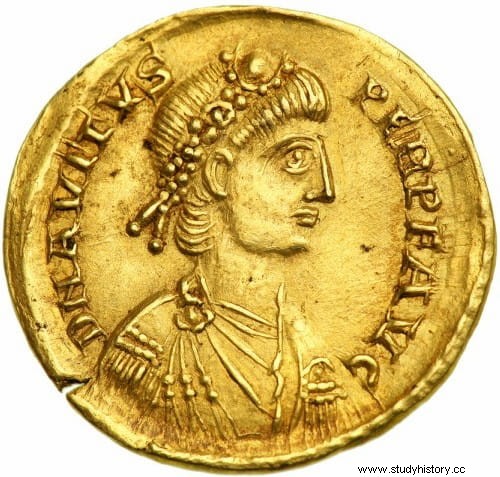
Unlike his predecessor, the emperor would be recognized by the titular Eastern Roman Empire, Marcian, but that had not yet happened when Ricimer and Majorian began the campaign by marching on Ravenna and defeating him at Piacenza in the fall of 456 AD. Avito fell prisoner and ended up executed. Then the new eastern emperor, Leo I the Thracian , named magister militum Majorian and Ricimer obtained the patriciate, further increasing his power.
He could not aspire to the throne because he was German, but he did not need it. In fact, it was good for him to be in the shade so as not to get burned and to dialogue more closely with the barbarians, who were beginning to abound both on the borders and inside the limes . Although he tried to make Leo the Thracian will name him dux of the West (a kind of governor), the Senate opposed this claim and had to content itself with ruling through Majoriano, with the approval of the Eastern Emperor. Majorian was proclaimed the new emperor by his troops in 457 after eliminating the umpteenth external threat, that of the Alemanni.
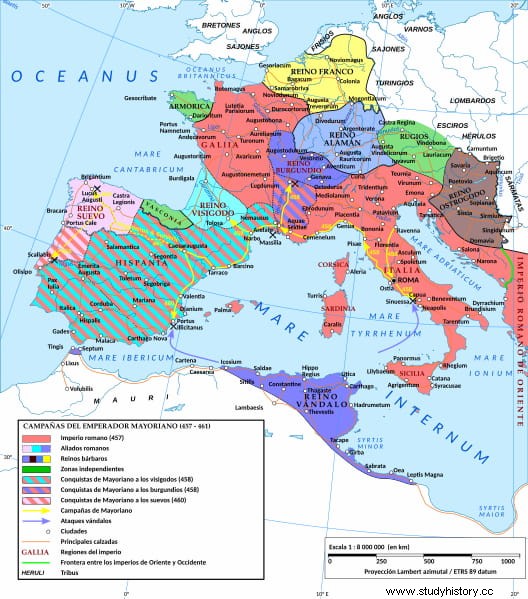
Unfortunately for Ricimer, the new ruler proved to have more personality than expected and not only starred in hopeful episodes, such as the reconquest of Gaul or the peace campaigns in Hispania that returned the Visigoths to their status of foederati , but he also carried out important legislative work by expanding the Theodosian Code and recovering the old institution of the defenders to protect the lower classes.
He also didn't take long to begin to limit the influence of his friend, which turned him against him. It was Genseric's vandals who did him a favor by defeating his superior near present-day Valencia; the Senate was disappointed with its ruler and Ricimer took the opportunity to incite a mutiny among his troops, having Majorian arrested and beheaded in the summer of 461. This assassination upset the military establishment and caused three generals, Egidio (of Gaul) , Marcellin (of Dalmatia) and Nepotiano (of Hispania) rebelled against him, who spent three months ruling in the absence of a holder for the throne.
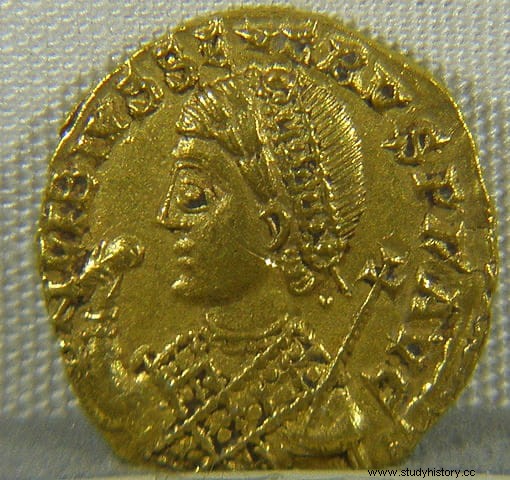
This led the Senate to nominate one of their own as a candidate:Libio Severo, a dull gray man who seemed perfect to Ricimer as a puppet, although Leon the Thracian and the three generals refused to acknowledge him. Quite a problem because the Vandals were still a threat and Rome needed Byzantine help, so Severus became an obstacle that needed to be removed; he died of poison in 465 and Ricimer was left alone in command of the empire for another eighteen months.
After this period, Leo crowned Procopius Anthemius, general of the Illyrian army whom he had sent to Italy to mediate between Ricimer and Genseric, since both wanted to impose their own candidates. Anthemius arrived accompanied by Marcellin, profiling himself as another hindrance for the intriguing Swabian, since he had prestige and was also linked by family with the Theodosian dynasty. To smooth things over, Ricimero agreed to marry his daughter Alipia and for a time everything went well.
At least until Anthemius appointed Marcellin as commander to finish off the Vandals once and for all. The campaign had three fronts, since it also had a Byzantine general, Basiliscus, and both had to bring their forces together like a pincer with those of the count of Egypt, Heraclius. Everything ended in disaster:the fleet commanded by Basilisk was destroyed by the enemy and Marcellin was killed by his own soldiers at the front. Seeing the weakening of Rome, the Vandals entered Italy again and even the Visigoths drew their weapons.
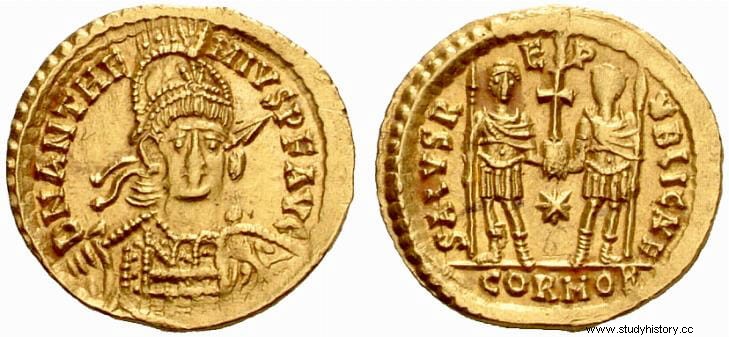
Anthemius accused the Roman senator, magister officiorum (foreign minister) and supporter of Ricimero, of inciting that mutiny to favor defeat, condemning him to death; It was a veiled way of accusing Ricimer himself, who for security reasons chose to go north with his mercenaries. Bishop Epiphanius of Pavia had to mediate between the two but to no avail because in 472 civil war broke out and the emperor, sick and somewhat paranoid, was besieged in Rome, taking refuge in the primitive Basilica of Saint Peter.
Genseric saw the occasion favorable to his interests and proposed to Leo, as a new mediator, the name of Flavio Anicio Olibrio, a Roman of ancient ancestry who was a relative of Petronio Máximo and grandson of Valentiniano III. Since he had lived in Constantinople, Leo knew him and accepted him, further pressured by the threat of Vandal attacks. Ricimer, unwilling to let the Vandal king take over, made an astonishing gamble and proclaimed Olybrius emperor. After five months of siege and the military reinforcement of Ricimero's nephew, General Gundebaldo Candiaco, who arrived with legions from Gaul, the city fell and Anthemius, who tried to flee disguised as a beggar, was scaffolded.
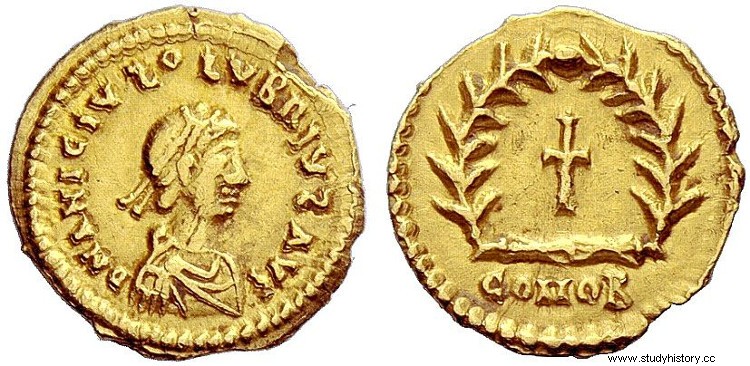
Olibrio did not want the crown - Leon did not want to recognize it as such either - but he had to resign himself. Now Ricimer did not get much of his triumph:he died after six weeks, in August 472, of internal bleeding; according to some poisoned and according to others cancer. His nephew, Gundebaldo, inherited the position of magister militum and with him his power:since the emperor also died of natural causes that fall, he followed in the footsteps of his uncle by proclaiming a substitute, Glicerio.
However, that route marked the end of Rome:Glicerio barely exceeded the year of his mandate and the following, Julius Nepos, did not exceed five when he had to flee to Dalmatia, giving way to Rómulus Augustulus, considered the last emperor of the West. Interestingly, he was deposed in 476 by the Herulian Odoacer, who four years earlier had ceded troops to Ricimer to defeat Anthemius.
